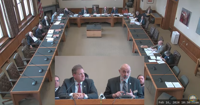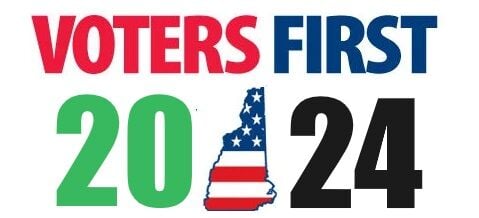CONCORD — A bill to permit up to 15 retail stores to sell recreational marijuana to adults in New Hampshire cleared a key House committee Wednesday.
The 17-3 vote of the House Commerce and Consumer Affairs Committee was the first step needed in a campaign that has had many fits and starts over the past 15 years.
The House of Representatives, under both Republican and Democratic control, has approved several plans that would have made New Hampshire the last New England state to permit adults to legally use cannabis recreationally.
The state Senate has been the place where those bills died.
In 2023, the Senate agreed with the House to create a commission to study the matter.
Last fall the commission finished its work without a majority coming out in favor of a specific plan.
State Rep. Erica Layon, a Derry Republican and an economist, rewrote her bill (HB 1633) and said the latest option was fiscally responsible, narrowly drawn and written to prevent children from getting easy access to cannabis.
“I really think this is the right model; no system is perfect, but I believe this would work for New Hampshire,” Layon said during an interview after the vote.
Last spring, Gov. Chris Sununu dropped his blanket opposition to the concept.
Sununu said he would support the idea if the product was sold at state-run stores under the control of the State Liquor Commission.
Supporters point out that no state has been able to sustain a state-run system in part because marijuana possession remains illegal under federal law.
Layon’s amendment would give the liquor agency the authority to approve the private or nonprofit companies that could open these 15 stores.
No individual could have a controlling interest in more than three stores under this plan.
The bill makes it against the law to advertise the sale of marijuana, including any use of billboards.
A ballot test in every community
The legislation would put the question of allowing stores on the ballot in every city or town.
If approved locally, stores would be limited to one per community or one per 15,000 people in larger towns or cities.
Retail store owners would pay to the state a monthly tax equal to 10% of retail sales that the bill refers to as a “fee.”
Layon said this is roughly the same as the 10% excise tax that marijuana retailers pay in Massachusetts.
Sales levies and other fees raise total taxes on marijuana sold in Massachusetts to more than 20%, she said.
“This would make New Hampshire a very attractive place for people outside the state to come here and purchase cannabis,” Layon said.
The lower tax also would make the black market sale of marijuana less attractive here, she said.
The Alternate Treatment Centers that currently sell marijuana to medically eligible patients in the state would be allowed to apply to sell to others for recreational use.
The 10% tax would be waived for sales of marijuana to medically eligible patients, Layon said.
Many state and local law enforcement leaders remain in strong opposition to legalizing marijuana, warning that it would lead to more crime and motor vehicle crashes.
The bill makes it against the law to use cannabis in public or while driving. Anyone caught driving while using would face up to a $150 fine and a suspension of a driver’s license for up to 60 days for a first offense.
In a key change, 65% of the net profit would go into the Education Trust Fund in support of aid to education.
This aid would then be used to reduce the statewide property tax in each community, she said.
“This would ensure what goes into the trust fund would translate into property tax relief,” Layon said.
The original bill would have set aside 65% to the state retirement system to reduce the unfunded liability of pensions for public employees.
Layon said some objected to having pensions financed with profits from cannabis sales.
Under this latest proposal, 10% would go to the state’s substance abuse and treatment fund, 10% to a new Community Reinvestment Fund to support water/sewer and other local projects, 5% for host communities and 5% for public safety enforcement.
The liquor commission would get $8 million from the current state budget to set up and administer the program while $500,000 would pay for an initial marketing campaign.











